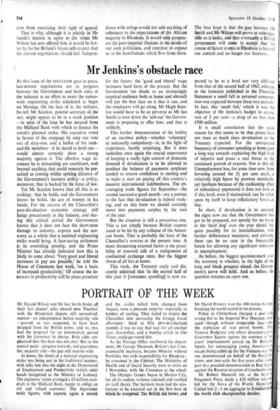Mr Jenkins's obstacle race
As this issue of the SPECTATOR goes to press, last-minute negotiations are in progress between the Government and both sides of the industry in an effort to avert the nation- wide engineering strike scheduled to begin on Monday. On the face of it, the militant, far-left Mr Scanlon, general secretary of the AEF, might appear to be in a weak position —in spite of the loan he has secured from the Midland Bank with which to finance his union's planned strike. His executive voted in favour of the stoppage by only one vote out of sixty-one, and a ballot of his rank- and-file members—if he dared to hold one— would almost certainly show a strong majority against it. The effective wage in- creases he is demanding are exorbitant, well beyond anything that could remotely be pre- sented as coming within spitting distance of the Government's incomes policy—a policy, moreover, that is backed by the force of law.
Yet Mr Scanlon knows that all this is as nothing: that he holds, and the Government knows he holds, the ace of trumps in his hands. For the success of the Chancellor's post-devaluation economic strategy still hangs precariously in the balance, and dur- ing this critical period the Government knows that it dare not face the short-term damage to industry, exports and the eco- nomy as a whole that a national engineering strike would bring. A face-saving settlement is. its overriding priority, and the Prime Minister has already indicated how this is likely to come about. 'Very good and liberal increases in pay are possible.' he told the House of Commons last week, on a basis of increased productivity.' Of course the in- creases in productivity will be pious promises for the future; the 'good and liberal' wage increases hard facts of the present. But the Government (no doubt to an increasingly sceptical audience both at home and abroad) will put the best face on it that it can, and the employers will go along. Mr Hugh Scan- lon would have to be as perverse as Mr Ian Smith to turn down the 'sell-out' the Govern- ment is preparing to offer him; and that is unlikely.
This further demonstration of the futility of an incomes policy—whether 'voluntary' or notionally compulsory—is, in the light of experience, hardly surprising. But it does underline once again the crucial importance of keeping a really tight control of domestic demand if devaluation is to be allowed to produce the balance of payments surpluses needed to restore confidence in sterling and to make a start on paying off this country's massive international indebtedness. The en- couraging trade figures for September—the second successive good month—are a pointer to the fact that devaluation is indeed work- ing, and on this form we should certainly move into payments surplus by the turn of the year.
But the situation is still a precarious one. This is not simply because British exports stand to be hit by any collapse of the Ameri- can boom. That is probably the least of the Chancellor's worries at the present time. A more threatening external factor is the possi- bility of renewed talk of a realignment of continental exchange rates. But the biggest threat of all lies at home.
This week, the Treasury coyly and dis- creetly admitted that 'in the second half of this year it [consumer spending] is now ex- pected to be at a level not very different from that of the second half of 1967, whereas in the forecasts published in the Financial Statement a small fall in personal consump. tion was expected between these two periods.'
In fact, this 'small fall,' which it was the objective of Mr Jenkins's budget to secure, was of 2 per cent—a drop of no less than £500 million.
It is small consolation that the main reason for this seems to be that prices have not risen as much since devaluation as the Treasury expected. For the unexpected buoyancy of consumer spending at home goes a long way towards explaining the high level of imports and poses a real threat to the continued growth of exports. Nor is this all.
Unemployment has, for some time now, been hovering around the 21 per cent mark, a relatively high figure by postwar standards; yet (perhaps because of the cushioning effect of redundancy payments) it does not look as if this level, even if Maintained, can 'be relied upon by itself to keep inflationary 'forces at bay.
In short, if devaluation is. .to succeed, the signs now are that the Government has got to be prepared, not merely for no let-up in the 'hard slog' over the year ahead, but quite possibly for its intensification, with further deflationary measures; and certainly there can be no case in the foreseeable future for allowing any significant reduction in unemployment.
As before, the biggest question-mark over the economy is whether, in the light of the long and bleak prospect ahead, the Govern• ment's nerve will bold. And as before, the question remains an open one.






































 Previous page
Previous page